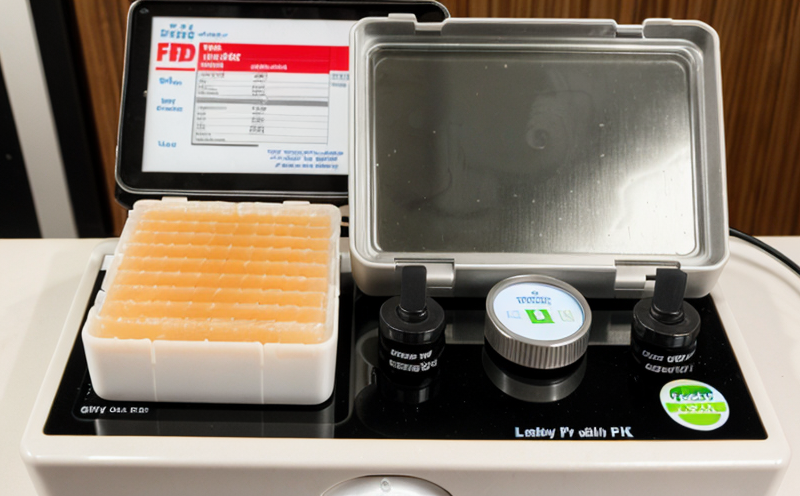EFSA Technical Protocol on Lipid and Fatty Acid Profiling
The European Food Safety Authority (EFSA) Technical Protocol on Lipid and Fatty Acid Profiling has become a cornerstone in the analysis of lipid components within food products. This protocol is essential for ensuring that processed foods meet stringent quality, safety, and nutritional standards set forth by regulatory bodies like EFSA. The protocol focuses on the identification and quantification of various lipids present in samples, including fatty acids, triglycerides, phospholipids, and sterols.
The testing process involves a series of sophisticated methods tailored to extract and analyze these components. Techniques such as gas chromatography (GC), high-performance liquid chromatography (HPLC), nuclear magnetic resonance spectroscopy (NMR), and mass spectrometry (MS) are employed depending on the lipid type and complexity of the sample matrix. These instruments provide precise data that helps in understanding the lipid profile's composition, which is crucial for regulatory compliance.
The protocol also emphasizes the importance of accurate sample preparation to ensure reliable results. This includes homogenization, extraction, purification, and derivatization steps designed to minimize interference from other components present in the food matrix. The choice of solvent systems and specific reagents plays a critical role in obtaining representative data.
Compliance with this protocol is vital for manufacturers who aim to meet EFSA’s requirements regarding the labeling and composition of their products. It ensures that consumers receive accurate information about the lipid content, which can influence health claims and dietary recommendations. Additionally, it helps in identifying potential safety issues related to trans fats or other harmful substances.
The results generated from this protocol are used not only for compliance purposes but also for research and development activities aimed at improving product formulations. Understanding the lipid profile allows food scientists to optimize recipes and develop new products that adhere strictly to health guidelines while enhancing consumer appeal.
In summary, adherence to EFSA’s Technical Protocol ensures robust scientific evidence supporting claims made about lipids in foods. It fosters trust among consumers by providing transparent information on product composition, supports regulatory compliance, and drives innovation within the food industry.
Why Choose This Test
- Precision: Utilizing advanced chromatography techniques ensures accurate measurement of lipid components.
- Rigorous Compliance: Meets strict standards set by EFSA and other regulatory bodies, ensuring product safety and quality.
- Scientific Validation: Provides comprehensive data that supports health claims and dietary recommendations.
- Innovation Support: Assists in R&D efforts to improve product formulations and introduce new healthier options.
- Consumer Trust: Ensures transparency regarding the lipid content of food products, enhancing consumer confidence.
- Regulatory Assurance: Helps manufacturers stay ahead of changing regulations and maintain market relevance.
Quality and Reliability Assurance
At our laboratory, we adhere to stringent quality assurance measures throughout the entire testing process. From initial sample reception through final reporting, every step is meticulously documented and validated to ensure consistency and accuracy. Our state-of-the-art facilities equipped with cutting-edge instrumentation guarantee reliable outcomes.
We employ certified personnel who undergo continuous training to stay updated on the latest methodologies and best practices recommended by EFSA and other relevant authorities. This ensures that our tests are not only compliant but also at the forefront of innovation in lipid profiling.
Our quality control procedures include regular calibration of equipment, internal audits, and participation in proficiency testing programs recognized internationally. These measures help maintain high standards and provide peace of mind to clients relying on our services for critical decisions affecting their business operations.
Customer Impact and Satisfaction
By leveraging the EFSA Technical Protocol, we empower our customers with actionable insights that drive informed decision-making. Our detailed reports provide a clear picture of the lipid profile in food products, enabling companies to make strategic choices regarding formulation changes or marketing strategies.
This service significantly impacts customer satisfaction by offering solutions tailored to their specific needs. Whether it's addressing compliance requirements, supporting R&D initiatives, or ensuring product safety, our comprehensive approach ensures that each client receives customized support aligned with their goals.
Moreover, the detailed analytical data generated through this protocol enhances transparency and builds trust between brands and consumers. This fosters long-term relationships based on reliability and excellence in service delivery.





